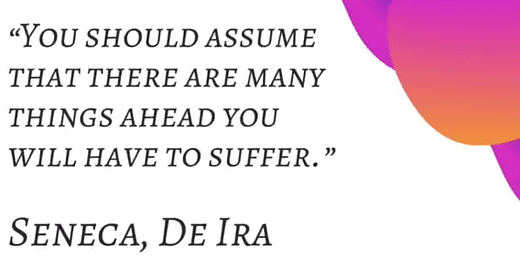The Handle You Choose Determines the Outcome
Marcus Aurelius once said “Time is a river, a violent current of events, glimpsed once and already carried past us, and another follows and is gone.” He uses the metaphor of the river to describe time because it is ever flowing, always moving in one direction, never to reverse course. It is a constant forward movement.
Our actions, like the river, are the same. Once an action has been completed, it cannot be taken back. It has occurred and it is over. Like a photograph, the action is forever tattooed in a moment of time. And yet, there are actions we take that we wished we hadn’t and there are actions we did not take, but wish we had and no longer can. We don’t always get it right. Sometimes we respond to an event in a way that we regret, or maybe we don’t respond at all and know we should have. Maybe we’ve responded in a way we should, but we weren’t satisfied fully with the response.
Demand Things Happen as They Will
Epictetus once preached to his students:
“Don’t demand that things happen as you wish, but wish that they happen as they do happen, and you will go on well.”
Epictetus is attempting to teach his students that life is not perfect. It will not always work out the way we want. Like Marcus’s metaphor of the river, our actions and time are ever moving, and we do not always get it right. But rather than lament over events we do not like the outcome of, we can learn to love and accept them.
There are Two Handles to All
There are two handles to every event in life, Epictetus used to say, “the one by which it may be carried, the other by which it cannot.” In other words, you can use any event to your own benefit and allow it to help you, or you can allow it to hinder you.
Two handles. One to help, one to hinder. And it is up to us to choose which we want for our lives.
How often do we suffer an event and lambast about how it did not go our way? We say things like, “The world is out to get us,” or ”I just have bad luck.” But is that really true? Sure, events do not always go our way, and most of us live in a world where events seldom work out for us the way we wished. But does that mean we can’t live a virtuous life? A life of excellence and success? No it does not because it is how we respond to an event that brings upon virtue.
Amor Fati
Friedrich Nietzsche popularized the term “Amor Fati” in his work Ecce Homo: How One Becomes What One Is, writing:
“My formula for greatness in a human being is amor fati: that one wants nothing to be different, not forward, not backward, not in all eternity. Not merely bear what is necessary, still less conceal it — all idealism is mendacity in the face of what is necessary — but love it.”
This concept is similar to that of Epictetus’ and the Stoics which had been preached many years earlier. To understand that events do not stop us is one of the most important lessons one can learn. An event can break you, only if you allow it. But to accept every event that happens, and to love that event for happening, good or bad, knowing that you can and will use the event for growth, that is the way of the Stoic.
Accept it — Life Contains Suffering
Life is suffering. No matter how you look at it, at one point or another, we all will suffer some event or fate that does not go our way. And in those times of defeat, it will be hard. But knowing that life is filled with suffering provides us freedom because it no longer surprises us. We know that once something happens, we will use it to our advantage, that nothing can stop us because we will grow from it. Sure, we may be sad, hurt, or disappointed for a while if an event does not go our way, but it will not break us.
We can and will use it as fuel for the future. To learn. To grow. To teach others and help them. Because ultimately that’s what life is, it is a series of events experienced individually and collectively as a community, as a population, as friends and family. We learn from the experiences of ourselves as well as the experiences of others.
This is by far the most important lesson one can learn in such trying times.
When you encounter an event or time in your life that is keeping you down, reflect upon this which Marcus Aurelius had to himself be reminded of:
“Objective judgment. Now at this very moment. Unselfish action. Now at this very moment. Willing acceptance — now at this very moment — of all external events. That’s all you need.”
The event can stop you only if you allow it. If not, then the world is filled with possibilities and growth.
But the choice is yours. You choose with every event which handle you want to grab.
This post was originally part of The Stoic Within’s Monday Meditations. Want to receive future meditations delivered right to your inbox? Sign up here.
This article contains affiliate links to the works referenced.





